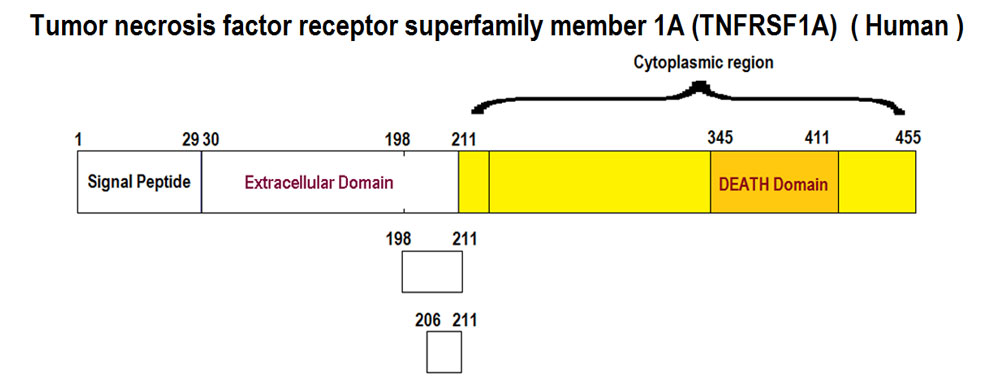
Despite anti-TNF therapy advancements for inflammatory diseases such as rheumatoid arthritis, the burden of diseases remains high. An 11-mer TNF peptide, TNF70-80, is known to stimulate selective functional responses compared to the parent TNF molecule. Here, we show that TNF70-80 binds to the TNF receptor, activating p38 MAP kinase through TNF receptor-associated factor 2. Using truncated TNFR mutants, we identify the sequence in TNFRI which enables p38 activation by TNF70-80. Peptides with this TNFRI sequence, such as TNFRI206-211bind to TNF and inhibit TNF-induced p38 activation, respiratory burst, cytokine production and adhesion receptor expression but not F-Met-Leu-Phe-induced respiratory burst in neutrophils. TNFRI206-211 does not prevent TNF binding to TNFRI or TNF-induced stimulation of ERK, JNK and NF-κB. TNFRI206-211 inhibits bacterial lipopolysaccharide-induced peritonitis, carrageenan-induced and antigen-induced paw inflammation, and respiratory syncytial virus-induced lung inflammation in mice. Our findings suggest a way of targeting TNF-p38 pathway to treat chronic inflammatory disorders.
Mukaro VR, Quach A, Gahan ME, et al. Nat Commun. 2018;9(1):1365.
Tumor necrosis factor alpha (TNF) has been shown to be an essential cytokine mediator of innate immunity in Klebsiella pneumonia. Recently, a TNF agonist peptide consisting of the 11-amino-acid TNF binding site (TNF70-80) has been shown to possess many of the leukocyte-activating properties of TNF without the associated toxicity when administered locally or systemically. Given the beneficial effects of TNF in gram-negative pneumonia, we hypothesize that the intratracheal (i.t.) administration of TNF70-80 would augment lung innate immunity in mice challenged with intrapulmonary Klebsiella pneumoniae. The administration of TNF70-80 i.t. to CBA/J mice 7 days prior to, but not concomitantly with, the i.t. delivery of 3 x 10(3) CFU of K. pneumoniae resulted in a marked increase in survival compared to that of animals receiving a control peptide i.t. In addition, pretreatment with TNF70-80 resulted in improved bacterial clearance, which occurred in association with enhanced lung myeloperoxidase activity (as a measure of lung polymorphonuclear leukocyte influx), and increased expression of the important activating cytokines TNF, macrophage inflammatory protein-2, interleukin-12, and gamma interferon compared that for animals receiving control peptide. Finally, the administration of TNF70-80 intraperitoneally resulted in enhanced rather than decreased lethality of Klebsiella pneumonia compared to that for animals receiving either TNF70-80 or control peptide i.t. Our studies suggest that the intrapulmonary, but not systemic, administration of the TNF agonist peptide may serve as an important immunoadjuvant in the treatment of murine Klebsiella pneumonia.
Laichalk LL, Bucknell KA, Huffnagle GB, et al. Infect Immun. 1998;66(6):2822-6.
| Catalog# | Product | Standard Size | Price |
|---|---|---|---|
| 054-51 | (Ile76)-alpha-TNF (70-80) (Human) | 500 µg | $223 |
| 054-53 | TNFR1 (198-211), D-form (Human) | 200 µg | $295 |
| 054-52 | TNFR1 (206-211), D-form (Human) | 500 µg | $193 |
Social Network Confirmation